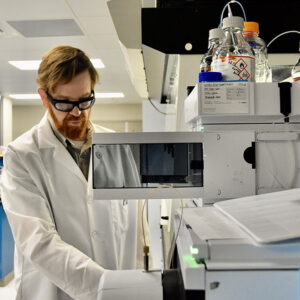
In early medical device product development, analytical testing of raw material commonly is viewed as more of a luxury than a necessity. However, early analytical testing offers medical device manufacturers the opportunity to produce more robust data to proactively mitigate risks to be better prepared for the regulatory submission process. This approach enables time and cost savings while contributing to a higher-quality final product.
Tackle Biocompatibility Issues Early
Materials not subjected to early testing (i.e., during device R&D) can contain impurities/contaminants that impact downstream biocompatibility issues, which can increase the risk of regulatory hurdles. Still, some organizations — aware of the regulatory scrutiny ahead — forgo early analytical testing for various reasons. For example, they may believe the time or cost for material characterization is not justified at such an early stage of the development process, or that their product already is considered low risk because it is based on predicate devices manufactured using similar materials, even though these materials may not have been tested for purity.
At times, raw materials intended for use in implantable medical devices are sourced from industrial manufacturers at the early R&D stage of a project. These facilities often lack the quality systems, ISO certifications, controls, and documentation to produce medical-grade materials. Partnering early in development with a supplier whose material already has been characterized and certified as medical grade enables the medical device manufacturer to develop a robust, repeatable process that meets form, fit, function, and biocompatibility requirements. Such a process also accounts for input variability, which is critical when the process is designed around a variable input, such as raw materials.
Additionally, recharacterizing medical device components and subassemblies after each process stage helps device manufacturers understand elements of a specific material that might alter it in some way (e.g., leachables caused by contact with raw materials), allowing for remediation well in advance of the submission process.
The Efficiencies of a Supplier with Internal Testing Capabilities
A supplier with in-house testing capabilities is a more efficient partner than a third-party lab. The supplier’s in-house lab already has established validated test methods directly applicable to its commonly used materials, giving that supplier a knowledge of those materials that exceeds even the most highly credentialed third-party lab.
Experienced suppliers can leverage a constantly growing internal database to problem-solve or guide a manufacturer towards using, for example, a previously characterized material on a new product prototype. A supplier with manufacturing and testing under the same roof can track material trends to proactively address potential issues, mitigating regulatory risk for manufacturers by performing analytical activities specific to the final product’s intended applications.
Third-party labs frequently have long lead times associated with their services — standard turnaround usually is 10 business days, per test, per iteration of a material — and requests for more complex analytical methodologies may increase that timeline. Clients also may face additional charges for expedited testing. Third-party lab customers also invest significant time and resources on shipping, sample receipt confirmation, and PO generation. A supplier with manufacturing and analytical lab capabilities set up on the same site eliminates these time-consuming tasks.
Just as critical, a supplier with internal analytical testing capabilities can tailor its report to a customer’s needs because the supplier knows its materials better than anybody else, including how the material integrates into the manufacturer’s product. A third-party lab may rely too heavily on standard testing (e.g., ISO, ASTM, USP) and return a report with too much information that doesn’t specifically address how the materials are expected to perform.
Level-up by Utilizing In-house Analytical Testing
Secant Group provides in-house analytical testing as part of the inherent value of our textile- and polymer-based materials and related services, rather than as a premium service. In addition to maintaining a well-equipped lab, we retain in-house testing personnel with extensive expertise and experience — an uncommon luxury among materials suppliers.
In-house testing also empowers us to prioritize customers operating under unforgiving timelines so they can keep a project on schedule (e.g., a customer must have final product testing data for a regulatory submission with a deadline of only a few weeks). At a third-party lab, that accommodation can trigger a 50% or a 100% premium. At Secant, it’s an intrinsic part of how we serve customers.
Final Thoughts
Ultimately, regarding analytical testing, most medical device manufacturers prioritize consistent quality and testing timeline optimization. Hiccups in early-phase iterations of a medical device project can quickly derail both.
Consider, too, that industry and regulatory agencies are trending toward requiring more analytical data earlier in the development cycle. Partnering with a material supplier that offers in-house testing capabilities minimizes time, cost, and risk while streamlining procurement of high-quality, medical grade-certified materials.
To learn more, contact the authors and visit https://secant.com/analytical-testing.
Additional Resources
- Basics of Biocompatibility: Information Needed for Assessment by the FDA
- BIOLOGICAL EVALUATION OF MEDICAL DEVICES – ASSESSMENT OF BIOCOMPATIBILITY UNDER ISO 10993-1:2018
- ISO 10993 and Biocompatibility – Material Certificates Are Not Enough!
About The Authors
Kitu Patel is Director of Quality at Secant Group. She has been a part of Secant Group since 2016, providing leadership, strategic vision, and functional expertise in key quality functions. She has over 15 years of experience in quality and operations in the medical and pharmaceutical industry. She has a BS in Thermochemical Process Engineering from Smith College and is an American Society of Quality Six Sigma Black Belt.
Brendan Nicholson is Manager of Analytical Services at Secant Group, where he leads Secant’s analytical chemistry capabilities to help advance internal and external customer projects. Brendan joined Secant Group in 2013, developing and characterizing polymeric biomaterials in the Research department. Since 2019, he has focused on the development of the Secant’s analytical lab. Brendan has more than 15 years of experience as an analytical chemist working in FDA-regulated and ISO-accredited labs. Brendan has a B.S. in Biochemistry from The Catholic University of America.
Stacey McElhaney is Associate Director of Operations and Program Management at SanaVita Medical, LLC, a contract manufacturing organization and sister company of Secant Group. She leads the operations and engineering development activities to expand contract manufacturing services and capabilities in support of medical device manufacturers in the orthopedic, minimally invasive surgery, and general surgery markets. Stacey first joined Secant Group in 2010, where she worked under both the Quality and the Product Development Departments. In 2016, she was selected to help build SanaVita Medical. Stacey holds a B.S. in Industrial Engineering from the University of Pittsburgh.
About Secant Group
Secant Group, LLC designs and develops custom-engineered, next-generation textiles and biomaterials solutions that enable repair, recovery, and regeneration of the human body.
With decades of experience in implantable medical component design, development, and manufacturing, Secant Group gives market leaders confidence to innovate more boldly across medical devices, cell therapy, tissue engineering, and drug delivery to make lifechanging breakthroughs more accessible to more patients with unmet needs.
From prototyping to commercialization, Secant Group is the collaborative, integrated partner of choice in the cardiovascular, neurovascular, orthopedic, surgical, and pharmaceutical spaces.
About SanaVita Medical
SanaVita Medical, LLC provides contract manufacturing and medical device processing services needed to bring innovative solutions to market. From finishing and assembly, packaging and labeling, sterilization management, and regulatory compliance, SanaVita Medical provides vital supply chain services. SanaVita Medical is an FDA-registered contract manufacturer with a robust Quality Management System compliant with ISO 13485. SanaVita’s expert regulatory team is equipped to handle complex projects from both North American and European markets.
